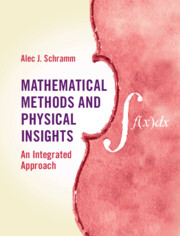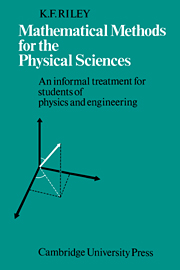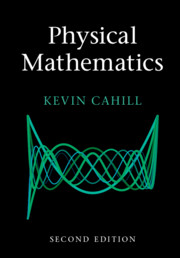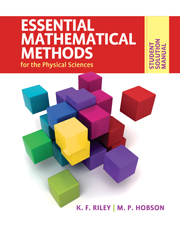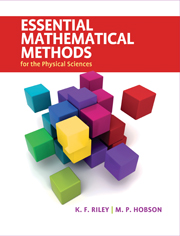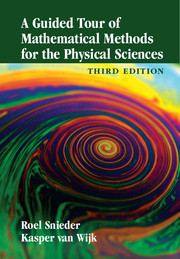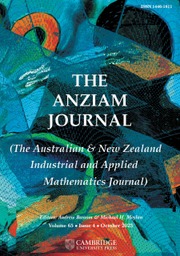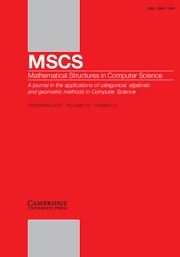Mathematical Methods and Physical Insights
An Integrated Approach
£54.99
- Author: Alec J. Schramm, Occidental College, Los Angeles
- Date Published: June 2022
- availability: In stock
- format: Hardback
- isbn: 9781107156418
£
54.99
Hardback
-
Mathematics instruction is often more effective when presented in a physical context. Schramm uses this insight to help develop students' physical intuition as he guides them through the mathematical methods required to study upper-level physics. Based on the undergraduate Math Methods course he has taught for many years at Occidental College, the text encourages a symbiosis through which the physics illuminates the math, which in turn informs the physics. Appropriate for both classroom and self-study use, the text begins with a review of useful techniques to ensure students are comfortable with prerequisite material. It then moves on to cover vector fields, analytic functions, linear algebra, function spaces, and differential equations. Written in an informal and engaging style, it also includes short supplementary digressions ('By the Ways') as optional boxes showcasing directions in which the math or physics may be explored further. Extensive problems are included throughout, many taking advantage of Mathematica, to test and deepen comprehension.
Read more- Initial chapters review essential mathematical concepts and techniques that students need to know, helping students to fill gaps in their background knowledge and enabling instructors to focus on the main course material
- Each Part has sections designed to highlight and apply the techniques and concepts within, so that physics motivates the math, which deepens understanding of physics
- Boxed asides throughout the book called 'By the Ways' (BTWs) provide optional digressions into the math or physics, to help to lift motivated students to the next level
- Flexible paths through the text allow it to be used for both one- and two-semester courses, depending on the course goals and instructor's preference
Awards
- Finalist, 2023 PROSE Chemistry, Physics, Astronomy, and Cosmology Award, Association of American Publishers
Reviews & endorsements
'Schramm's Mathematical Methods and Physical Insights is a very welcome new textbook in the area of pedagogical mathematical physics. The book contains numerous insightful and helpful examples from classical and modern physics, as well as unusual and interesting applications of the presented mathematical concepts within and beyond physics. I find the 'BTW' inserts, and the lively, unpretentious style of the book both exciting and entertaining. The material discussed in Schramm's textbook covers entirely the scope of our three-trimester-long Mathematical Methods offering, and additionally provides useful background material to 'even out' the often inhomogeneous preparation of students in these classes; I will definitely consider adopting this textbook for my next offerings of Mathematical Methods for Physics here at the University of California, Santa Cruz.' Professor Stefano Profumo, University of California, Santa Cruz
See more reviews'As the title suggests, Schramm's book distinguishes itself from traditional mathematical methods texts in its thematic approach that builds from unit to unit, using rich examples from physical systems that elucidate each topic. A must-read for physicists wanting to expand their mathematical toolkit as well as for mathematicians hoping to gain new insights from the physical world.' Professor Jason Detwiler, University of Washington
'For students taking physics courses, one of the difficulties is how to apply appropriate mathematical skills in problem solving (e.g., using integration to find the electric field produced by a continuous charge distribution). This book introduces commonly used mathematical skills from the perspective of a physicist. Focusing on the topics in upper-level physics courses, it provides the mathematical skills for solving problems in each topic. The book is easy to read, and the problems at the end of each chapter offer plenty of exercises for students. The book is a valuable resource for undergraduate students taking upper-level physics courses, and instructors teaching such courses. It could also be a useful reference for graduate students.' Professor Hong Lin, Bates College
'Physics and engineering students often struggle with mathematics texts that present the material in an abstract fashion, disconnected from practical applications. Schramm's text represents a refreshing and much needed change. Providing context and intuition throughout, with many worked examples, and in engaging prose, it does more than just explain mathematical methods; it infuses them with meaning and relevance.' Dr. Jochen Rau, RheinMain University of Applied Sciences, Germany
Customer reviews
Not yet reviewed
Be the first to review
Review was not posted due to profanity
×Product details
- Date Published: June 2022
- format: Hardback
- isbn: 9781107156418
- length: 786 pages
- dimensions: 253 x 193 x 38 mm
- weight: 1.82kg
- availability: In stock
Table of Contents
Preface
Part I. Things You Just Gotta' Know:
1. Prelude: symbiosis
2. Coordinating coordinates
3. Complex numbers
4. Index algebra
5. Brandishing binomials
6. Infinite series
7. Interlude: orbits in a central potential
8. Ten integration techniques and tricks
9. The Dirac delta function
10. Coda: statistical mechanics
Part II. The Calculus of Vector Fields:
11. Prelude: visualizing vector fields
12. grad, div & curl
13. Interlude: irrotational and incompressible
14. Integrating scalar & vector fields
15. The theorems of Gauss & Stokes
16. Simply connected regions
17. Coda: mostly Maxwell
Part III. Calculus in the Complex Plane:
18. Prelude: path independence in the complex plane
19. Series, singularities & branches
20. Interlude: conformal mapping
21. The calculus of residues
22. Coda: analyticity & causality
Part IV. Linear Algebra:
23. Prelude: superposition
24. Vector space
25. The inner product
26. Interlude: rotations
27. The Eigenvalue problem
28. Coda: normal modes
Entr'acte: Tensors
29. Cartesian tensors
30. Beyond cartesian
Part V. Orthogonal Functions:
31. Prelude:
1 2 3 . . . infinity
32. Eponymous polynomials
33. Fourier series
34. Convergence and completeness
35. Interlude: beyond the straight & narrow
36. Fourier transforms
37. Coda: of time intervals and frequency bands
Part VI. Differential Equations:
38. Prelude: first order first
39. Second-order ODEs
40. Interlude: the Sturm-Liouville Eigenvalue problem
41. Partial differential equations
42. Green's functions
43. Coda: quantum scattering
Appendix A. Curvilinear coordinates
Appendix B. Rotations in R3
Appendix C. The Bessel family of functions
References
Index.
Sorry, this resource is locked
Please register or sign in to request access. If you are having problems accessing these resources please email [email protected]
Register Sign in» Proceed
You are now leaving the Cambridge University Press website. Your eBook purchase and download will be completed by our partner www.ebooks.com. Please see the permission section of the www.ebooks.com catalogue page for details of the print & copy limits on our eBooks.
Continue ×Are you sure you want to delete your account?
This cannot be undone.
Thank you for your feedback which will help us improve our service.
If you requested a response, we will make sure to get back to you shortly.
×
